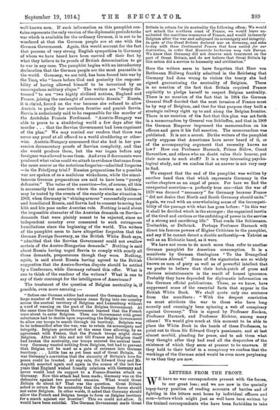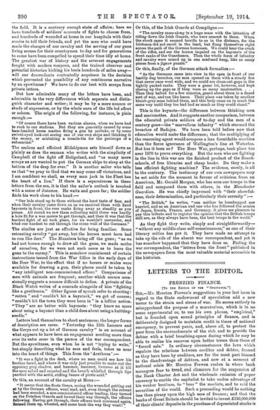LETTERS FROM THE FRONT.
WE have no war correspondents present with the forces, to our great loss; and we are now in the quaintly topsy-turvy position of reading accounts of battles and of fighting in the letters sent home by individual officers and men—letters which might just as well have been written by the trained correspondents who have been forbidden to take
the field. It is a contrary enough state of affairs; here we have hundreds of soldiers' accounts of fights to choose from, and hundreds of wounded at home in our hospitals with their stories to tell their friends, and yet the men who could have made the charges of our cavalry and the serving of our guns living scenes for their countrymen to-day and for generations to come have been compelled to spend their time idly at home.
The greatest war of history and the severest engagements fought with modern weapons, and the trained observer and potential historian kicking his heels hundreds of miles away— will our descendants contentedly acquiesce in the decision which prevented the possibility of any continuous narrative by an eyewitness We have to do our best with scraps from private letters.
But how admirable many of the letters have been, and admirable in the very differences which separate and distin- guish character and writer; it may be by a mere nuance or shade of expression, or by the whole aura of the life led afloat or ashore. The origin of the following, for instance, is plain enough :—
" Of coarse there have been various alarms, when we have had to rush to our stations. But they are generally caused by some ham-handed horse marine firing a gun by mistake, or by some swivel-eyed look-out seeing one of our own ships and thinking it the enemy, or mistaking a treacle-tin for the periscope of a submarine."
The zealous and efficient Midshipman sets himself down as plainly as does the seaman who writes with the simplicity of Campbell of the fight off Heligoland, and "as many more scraps as are wanted to put the German ships to sleep at the bottom of the deep for ever." It is another sailor who tells us that " we pray to God that we may come off victorious, and I am confident we shall, as every man jack in the Fleet has the heart of a lion." If there is a separateness in these letters from the sea, it is that the sailor's outlook is touched with a sense of distance. He waits and gazes far ; the soldier finds his work close to his hand :-
" Our lads stood up to them without the least taste of fear, and when their cavalry came down on us we received them with fixed bayonets in front, the rear ranks firing away as steadily as you please. All round we saw them collecting until there was hardly a hole fit for a wee mouse to get through, and then it was that the hardest fight of all took place, for we wouldn't surrender, and tried our hardest to cut through the stone wall of the Germans."
The similes are just as effective for being familiar. Some retreating cavalry "got away, but the horses must have had to run like deer." The Munsters bring off the guns ; " as we had not horses enough to draw all the guns, we made mules of ourselves, for we were not such asses as to leave the guns to the enemy." This is somehow reminiscent of certain instructions issued from the War Office in the early days of the Beer War, to the effect that if no horses or mules were available for drawing a gun, their places could be taken by "any intelligent non-commissioned officer." Comparisons of men with animals are frequent; another which occurs occa- sionally suggests a nuance difficult to define. A private of the Black Watch writes of a comrade alongside of him "fighting like a gentleman." Other figures of speech refer to shooting : "rotten " and "couldn't hit a haystack," we get of course; "couldn't hit the town they were born in" is a loftier notion. "They" are no better with bayonets : "they know no more about using a bayonet than a child does about using a knitting-
needle."
Letters lend themselves to short sentences; the longer forms of description are rarer. "Yesterday the 12th Lancers and the Greys cut up a lot of German cavalry" is an account of what appears to have been an engagement needing more than ever its rates sacer in the person of the war correspondent. But the eyewitness, even when he is not " trying to write," but simply describing what he sees and feels, takes us near into the heart of things. This from the Arethusa '
"It was a fight in the dark, where no man could see how his brother fared, and where it was only just possible to make out the opposing grey shadow, and hammer, hammer, hammer at it till the eyes ached and smarted and the breath whistled through lips parched with the acrid, stifling fumes of picric acid."
Or this, an account of the cavalry at Mons :-
" It seems that the Scots Greys, seeing the wounded getting cut at by the German officers, went mad, and, even though the retreat had been sounded, a non-commissioned officer leading, they turned on the Potsdam Guards and hewed their way through, the officers following. Having got through, their officers took command again, formed them up, wheeled, and came back the way they went!"
Or this, of the Irish Guards at Compiegne :—
" The cavalry came along in a huge mass with the intention of riding down the Irish Guards, who were nearest to them. When the shock came it seemed terrific to us in the distance, for the Irishmen did not recoil in the least, but flung themselves right across the path of the German horsemen. We could hear the crack of the rifles, and see the horses impaled on the bayonets of the front ranks of the Guardsmen. Then the whole force of infantry and cavalry wore mixed up in one confused heap, like so many pieces from a jigsaw puzzle."
Or this, finally, of the German attack formation:— " As the Germans came into view in the open in front of our hastily dug trenches, our men opened on them with a steady fire that never once went wide, and we could see clean-cut gaps in the tightly packed ranks. They were a game lot, however, and kept closing np the gaps as if they were so many marionettes. . . Then they halted for a few minutes, gazed about them in a dazed sort of way, and ran like hares. Their place was taken by another bluish-grey mass behind them, and this body came on in much the same way until they too had had as much as they could stand."
This is the keynote—the difference between thinking men and marionettes. And it suggests another comparison, between the educated private soldiers of to-day and the men of a century gone—the " marvellous infantry " which stormed the breaches of Badajoz. We have been told before now that education would make the difference; that the multiplying of the reasoning agent would compose a less formidable machine than the fierce ignorance of Wellington's line at Waterloo. But has it been so ? The Boer War, perhaps, took place too near 1870 to prove everything. But the men who are fighting in the line in this war are the finished product of the Board- schools, of free libraries and cheap books. Do they make a less efficient fighting machine ? The evidence, surely, is all to the contrary. The testimony of our own newspapers may be set aside for the moment in favour of criticism from an American, Mr. Gerald Morgan, who has seen our troops in the field and compared them with others, in the Manchester Guardian. He was chiefly impressed with "their cheerful- ness, their determination, and particularly their serenity ":—
" The British," he writes, "can neither be humbugged nor hurried, and as an American and one who has followed the armies of Japan, Russia, France, and Germany, it gives me pleasure to pay this tribute and to register the opinion that the British troops still are, as they always have been, the best troops in the world."
As they fight they write, simply and straightforwardly-7. " without any middle-class self-consciousness," as one of their literary critics has put it. They have made no attempt to take up the rae of the absent war correspondent, and yet it has somehow happened that they have done so. Failing the war correspondent, the "letters from the front" published in the newspapers form the most valuable material accessible to the historian.



































 Previous page
Previous page